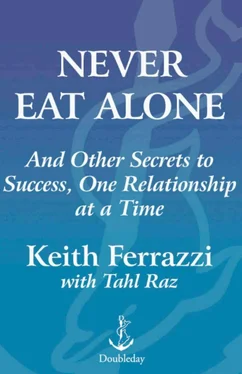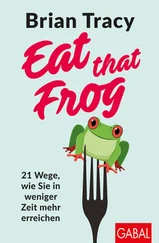Keith Ferrazzi - Never Eat Alone
Здесь есть возможность читать онлайн «Keith Ferrazzi - Never Eat Alone» весь текст электронной книги совершенно бесплатно (целиком полную версию без сокращений). В некоторых случаях можно слушать аудио, скачать через торрент в формате fb2 и присутствует краткое содержание. Год выпуска: 2005, ISBN: 2005, Издательство: C U R R E N C Y • D O U B L E D A Y, Жанр: marketing, на английском языке. Описание произведения, (предисловие) а так же отзывы посетителей доступны на портале библиотеки ЛибКат.
- Название:Never Eat Alone
- Автор:
- Издательство:C U R R E N C Y • D O U B L E D A Y
- Жанр:
- Год:2005
- ISBN:0-385-51529-4
- Рейтинг книги:4 / 5. Голосов: 1
-
Избранное:Добавить в избранное
- Отзывы:
-
Ваша оценка:
- 80
- 1
- 2
- 3
- 4
- 5
Never Eat Alone: краткое содержание, описание и аннотация
Предлагаем к чтению аннотацию, описание, краткое содержание или предисловие (зависит от того, что написал сам автор книги «Never Eat Alone»). Если вы не нашли необходимую информацию о книге — напишите в комментариях, мы постараемся отыскать её.
Never Eat Alone — читать онлайн бесплатно полную книгу (весь текст) целиком
Ниже представлен текст книги, разбитый по страницам. Система сохранения места последней прочитанной страницы, позволяет с удобством читать онлайн бесплатно книгу «Never Eat Alone», без необходимости каждый раз заново искать на чём Вы остановились. Поставьте закладку, и сможете в любой момент перейти на страницу, на которой закончили чтение.
Интервал:
Закладка:
Never eat alone
And Other Secrets to Success, One Relationship at a Time
I. The Mind-Set
1. Becoming a Member of the Club
Relationships are all there is. Everything in the universe only exists because it is in relationship to everything else. Nothing exists in isolation. We have to stop pretending we are individuals that can go it alone.
— MARGARET WHEATLEYНow on earth did I get in here?" I kept asking myself in those early days as an overwhelmed first-year student at Harvard Business School.
There wasn't a single accounting or finance class in my background. Looking around me, I saw ruthlessly focused young men and women who had undergraduate degrees in business. They'd gone on to crunch numbers or analyze spreadsheets in the finest firms on Wall Street. Most were from wealthy families and had pedigrees and legacies and Roman numerals in their names. Sure, I was intimidated.
How was a guy like me from a working-class family, with a liberal arts degree and a couple years at a traditional manufacturing company, going to compete with purebreds from McKinsey and Goldman Sachs who, from my perspective, seemed as if they'd been computing business data in their cribs?
It was a defining moment in my career, and in my life.
I was a country boy from southwestern Pennsylvania, raised in a small, hardworking steel and coal town outside of Latrobe called Youngstown. Our region was so rural you couldn't see nother house from the porch of our modest home. My father worked in the local steel mill; on weekends he'd do construction. My mother cleaned the homes of the doctors and lawyers in a nearby town. My brother escaped small-town life by way of the army; my sister got married in high school and moved out when I was a toddler.
At HBS, all the insecurities of my youth came rushing back. You see, although we didn't have much money, my dad and mom were set on giving me the kind of opportunities my brother and sister (from my mom's previous marriage) never got. My parents pushed me and sacrificed everything to get me the kind of education that only the well-to-do kids in our town could afford. The memories rushed back to those days when my mother would pick me up in our beat-up blue Nova at the bus stop of the private elementary school I attended, while the other children ducked into limos and BMWs. I was teased mercilessly about our car and my polyester clothes and fake Docksiders—reminded daily of my station in life.
The experience was a godsend in many ways, toughening my resolve and fueling my drive to succeed. It made clear to me there was a hard line between the haves and the have-nots. It made me angry to be poor. I felt excluded from what I saw as the old boys' network. On the other hand, all those feelings pushed me to work harder than everyone around me.
Hard work, I reassured myself, was one of the ways I'd beaten the odds and gotten into Harvard Business School. But there was something else that separated me from the rest of my class and gave me an advantage. I seemed to have learned something long before I arrived in Cambridge that it seemed many of my peers had not.
As a kid, I caddied at the local country club for the homeowners and their children living in the wealthy town next to mine. It made me think often and hard about those who succeed and those who don't. I made an observation in those days that would alter the way I viewed the world.
During those long stretches on the links, as I carried their bags, I watched how the people who had reached professional heights unknown to my father and mother helped each other. They found one another jobs, they invested time and money in one another's ideas, and they made sure their kids got help getting into the best schools, got the right internships, and ultimately got the best jobs.
Before my eyes, I saw proof that success breeds success and, indeed, the rich do get richer. Their web of friends and associates was the most potent club the people I caddied for had in their bags. Poverty, I realized, wasn't only a lack of financial resources; it was isolation from the kind of people that could help you make more of yourself.
I came to believe that in some very specific ways life, like golf, is a game, and that the people who know the rules, and know them well, play it best and succeed. And the rule in life that has unprecedented power is that the individual who knows the right people, for the right reasons, and utilizes the power of these relationships, can become a member of the "club," whether he started out as a caddie or not.
This realization came with some empowering implications. To achieve your goals in life, I realized, it matters less how smart you are, how much innate talent you're born with, or even, most eyeopening to me, where you came from and how much you started out with. Sure all these are important, but they mean little if you don't understand one thing: You can't get there alone. In fact, you can't get very far at all.
Fortunately, I was hungry to make something of myself (and, frankly, even more terrified that I'd amount to nothing). Otherwise, perhaps I would have just stood by and watched like my friends in the caddy yard.
I first began to learn about the incredible power of relationships from Mrs. Poland. Carol Poland was married to the owner of the big lumberyard in our town, and her son, Brett, who was my age, was my friend. They went to our church. At the time, I probably wanted to be Brett (great athlete, rich, all the girls falling over him).
At the club, I was Mrs. Poland's caddie. I was the only one who cared enough, ironically, to hide her cigarettes. I busted my behind to help her win every tournament. I'd walk the course the morning before to see where the tough pin placements were. I'd test the speed of the greens. Mrs. Poland started racking up wins left and right. Every ladies day, I did such a great job that she would brag about me to her friends. Soon, others requested me.
I'd caddie thirty-six holes a day if I could get the work, and I made sure I treated the club caddie-master as if he were a king. My first year, I won the annual caddie award, which gave me the chance to caddie for Arnold Palmer when he came to play on his hometown course. Arnie started out as a caddie himself at the Latrobe Country Club and went on to own the club as an adult. I looked up to him as a role model. He was living proof that success in golf, and in life, had nothing to do with class. It was about access (yes, and talent, at least in his case). Some gained access through birth or money. Some were fantastic at what they did, like Arnold Palmer. My edge, I knew, was my initiative and drive. Arnie was inspirational proof that your past need not be prologue to your future.
For years I was a de facto member of the Poland family, splitting holidays with them and hanging out at their house nearly every day. Brett and I were inseparable, and I loved his family like my own. Mrs. Poland made sure I got to know everyone in the club that could help me, and if she saw me slacking, I'd hear it from her. I helped her on the golf course, and she, in appreciation of my efforts and the care I bestowed upon her, helped me in life. She provided me with a simple but profound lesson about the power of generosity. When you help others, they often help you. Reciprocity is the gussied-up word people use later in life to describe this ageless principle. I just knew the word as "care." We cared for each other, so we went out of our way to do nice things.
Because of those days, and specifically that lesson, I came to realize that first semester at business school that Harvard's hypercompetitive, individualistic students had it all wrong. Success in any field, but especially in business, is about working with people, not against them. No tabulation of dollars and cents can account for one immutable fact: Business is a human enterprise, driven and determined by people.
Читать дальшеИнтервал:
Закладка:
Похожие книги на «Never Eat Alone»
Представляем Вашему вниманию похожие книги на «Never Eat Alone» списком для выбора. Мы отобрали схожую по названию и смыслу литературу в надежде предоставить читателям больше вариантов отыскать новые, интересные, ещё непрочитанные произведения.
Обсуждение, отзывы о книге «Never Eat Alone» и просто собственные мнения читателей. Оставьте ваши комментарии, напишите, что Вы думаете о произведении, его смысле или главных героях. Укажите что конкретно понравилось, а что нет, и почему Вы так считаете.












